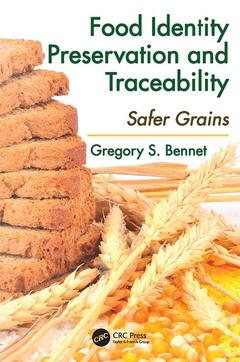Food Identity Preservation and Traceability Safer Grains
Auteur : Bennet Gregory S.

A Practical Roadmap to IPT Integration
From baby formula and peanut butter, to E. coli-tainted peppers and salmonella-tainted pistachios, no food product or means of its production is immune to risks. And while these risks may never be fully eliminated, identity preservation and traceability (IPT) systems make it easier to determine the source and extent of contamination, thereby reducing the often deadly consequences.
With a core emphasis on grain, this encyclopedic reference documents the state-of-the-science throughout the entire food chain in both domestic and international markets as it relates to food safety and economics. The book provides a cohesive introduction to IPT systems and summarizes the programs currently available, in effect developing a conceptual model of IPT at the producer level.
Addresses the History, Theory, and Design Components
Beginning with an informative history of IPT, the book continues with examples of IPT programs and standards of official seed organizations. It then provides a sampling of government, industry, and company approaches toward IPT systems throughout the past two decades. For ease of use as a reference, most chapters begin with a brief description of the essentials necessary to understand the chapter?s contents allowing readers to jump right in, rather than having to read chapters in sequential order.
Providing an in-depth understanding of the complexity of IPT systems, the rules they function under, and how they are shaped and modified, this valuable resource effectively demonstrates why IPT is a critical practice for food safety.
GENERAL INTRODUCTION. PROGRAMS AND STANDARDS. AUDITORS AND LABORATORIES. CONSULTATIVE AND SERVICE.RESEARCH INSTRUMENTS.
Iowa State University, Ames, USA
Date de parution : 06-2017
15.6x23.4 cm
Disponible chez l'éditeur (délai d'approvisionnement : 14 jours).
Prix indicatif 93,24 €
Ajouter au panierDate de parution : 10-2009
Ouvrage de 512 p.
15.6x23.4 cm
Mots-clés :
Certi Cation; IP; Food Identity Preservation and Traceability; Gm Food; Gregory S; Bennet; Traceability Systems; food safety; Genetically Modi Ed Organisms; food quality management; Certi Ed; food supply chain; recall liability insurance; Veri Cation; international food trade; Gm Crop; food authentication; Crop Improvement Association; agricultural marketing; Certi Cation Program; Credence Attributes; Iowa State University; Identi Cation; IP System; ISF; Recall Insurance; Global Food Safety Initiative; FSMS; AIB; Test Kit; EU Regulation; Genetic Modi Cation; Bene Ts; Gm Content



